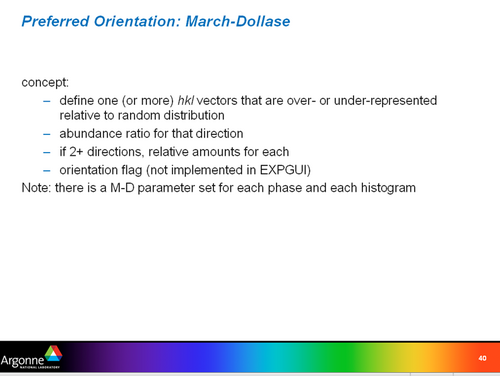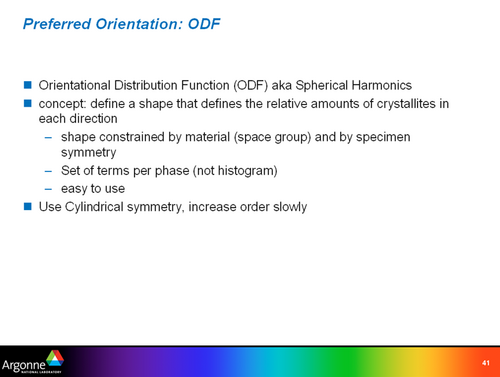Difference between revisions of "Preferred orientation in EXPGUI/GSAS"
| Line 1: | Line 1: | ||
GSAS/EXGUI has 2 implemented approaches to deal with preferred orientation: | GSAS/EXGUI has 2 implemented approaches to deal with preferred orientation: | ||
1) March-Dollase correction | 1) '''March-Dollase correction'''; this requires that you state specific hkl values. | ||
requires that you state specific hkl values. | |||
2) Spherical harmonics correction (Orientational Distribution Function) | 2) '''Spherical harmonics correction (Orientational Distribution Function)'''; a bit more flexible, and the suggested starting approache. | ||
Slides at the bottom of the page give more info on both approaches. | Slides at the bottom of the page give more info on both approaches. | ||
Revision as of 15:52, 12 September 2011
GSAS/EXGUI has 2 implemented approaches to deal with preferred orientation:
1) March-Dollase correction; this requires that you state specific hkl values.
2) Spherical harmonics correction (Orientational Distribution Function); a bit more flexible, and the suggested starting approache.
Slides at the bottom of the page give more info on both approaches.
Also, there are some hints & help can be found on the ccp14 website here: http://sdpd.univ-lemans.fr/du-sdpd/nexus/ccp14/web/solution/gsas/spher_h2.htm
For Debye-Scherrer geometry, the spherical harmonics terms of omega, chi & phi should be set to (0,0,0). I'm told that the default values of omega, chi & phi (0,90,0) are appropriate for Bragg-Brentano diffraction. Also, according to "experience" (aka Bob Von Dreele), texture is "rare" for Debye-Scherrer data, changing these (0,0,0) terms is really needed.
It is suggested to start with a low order number for the spherical harmonic correction, and slowly increase the order number. If preferred orientation is present, this should starting improving the fit.
You can also see pages 141-144 of the GSAS Manual for a full description of the coordinate systems and Eulerian rotation angles used for spherical harmonics texture.
or for more about Spherical Harmonics in GSAS, refer to:
Von Dreele, R. B. (1997). Quantitative texture analysis by Rietveld refinement. J. Appl. Cryst. 30, 517-525.
The slides below are taken from GSAS Parameters & Controls chapter of Brian Toby's excellent series of web-based GSAS/EXGUI tutorials.

